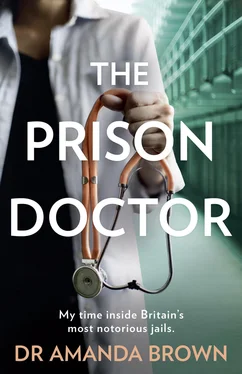DR AMANDA BROWNis a GP at the largest women-only prison in Europe, Bronzefield. She was a regular NHS GP for a number of years, until she gave up her practice to move into the prison service. She worked at a teenage detention centre, before moving on to Wormwood Scrubs and then finally to Bronzefield where she continues to practice to this day. The Prison Doctor is her first book.
THE PRISON DOCTOR
DR AMANDA BROWN

ONE PLACE. MANY STORIES
Copyright

An imprint of HarperCollins Publishers Ltd
1 London Bridge Street
London SE1 9GF
First published in Great Britain by HQ in 2019
Copyright © Dr. Amanda Brown and Ruth Kelly 2019
Dr Amanda Brown and Ruth Kelly asserts the moral right to be identified as the author of this work.
A catalogue record for this book is available from the British Library.
This novel is entirely a work of fiction. The names, characters and incidents portrayed in it are the work of the author’s imagination. Any resemblance to actual persons, living or dead, events or localities is entirely coincidental.
All rights reserved under International and Pan-American Copyright Conventions. By payment of the required fees, you have been granted the non-exclusive, non-transferable right to access and read the text of this e-book on-screen. No part of this text may be reproduced, transmitted, downloaded, decompiled, reverse engineered, or stored in or introduced into any information storage and retrieval system, in any form or by any means, whether electronic or mechanical, now known or hereinafter invented, without the express written permission of HarperCollins.
Ebook Edition © May 2019 ISBN: 9780008311452
‘The mind is its own place and in itself can make a Heaven of Hell, a Hell of Heaven.’
– JOHN MILTON, Paradise Lost
Contents
Cover
About the Author
Title Page
Copyright
Epigraph
Prologue
PART ONE
Where It All Began (2004–2009)
Chapter One
Chapter Two
Chapter Three
Chapter Four
Chapter Five
Chapter Six
PART TWO
The Scrubs (2009–2016)
Chapter Seven
Chapter Eight
Chapter Nine
Chapter Ten
Chapter Eleven
Chapter Twelve
Chapter Thirteen
Chapter Fourteen
Chapter Fifteen
Chapter Sixteen
Chapter Seventeen
Chapter Eighteen
Chapter Nineteen
Chapter Twenty
Chapter Twenty-One
PART THREE
HMP Bronzefield (2016–present)
Chapter Twenty-Two
Chapter Twenty-Three
Chapter Twenty-Four
Chapter Twenty-Five
Chapter Twenty-Six
Acknowledgements
About the Publisher
Prologue
HMP Bronzefield
I arrived to shouting and screaming. Prison officers were sprinting across the corridor and up the metal stairs.
‘What’s happening?’ I shouted, thinking a fight must have broken out.
I’ve seen and heard a lot during my fifteen years as a prison doctor, but the reply shocked me.
‘Someone’s having a baby!’ one of the officers yelled, repeating the news into his radio. He called for back-up, an ambulance, nurses, for all medical staff to come to House Block One.
‘ Oh bloody hell! ’
I followed the stampede. We sounded like a small army trampling up the metal stairs.
The deep stench of overcooked vegetables from lunch lingered in the air, green and ripe, sweet and rotten, mixed with sweat and cheap soap.
The prisoners heard us coming, thumping their fists on their cell doors. Metal thunder, filling the air.
Half a dozen officers were already crowded outside the entrance to the tiny cell at the end.
‘Coming through!’ I said, squeezing past them.
A shaft of light poured through the small barred window. Hiding in the shadows of the corner was a tiny young woman, standing and shaking. Her nightie was soaked in blood from the waist down. The walls were splattered too; violent red sprays, like protest graffiti.
She looked completely shell-shocked. In that moment, she didn’t know where or who she was. Her wiry black hair was drenched in sweat and glued across her face.
But where was the baby?
I tried to appear calm, stepping closer, trying to reassure her.
‘Hi, sweetheart, you’re going to be okay.’
Who knew if that were true? I suspected the prisoner was a heroin addict currently on methadone. The majority of prisoners on House Block One had a history of substance misuse.
The banging of the doors grew louder. Shouting and swearing, the air full of heat and sound and pressure. When the prison was like that it felt as if a spark could blow the place sky high.
The woman started screaming.
‘Get it out of me! Get it out of me!’
She must have meant her placenta because there, partially hidden by the bed, lying in a pool of blood on the cold prison floor, was a tiny baby girl.
I looked around, trying to see something I could use to wrap her up. The umbilical cord was torn, presumably ripped apart by her mother. The baby was so small I suspected she was a good few weeks premature. But was she alive? Was this poor, poor girl ali—
To my overwhelming relief she started to cry.
‘Has anyone got any clean towels?’ I asked.
‘Here you go, Doc.’ Becky, the prison officer, handed me the only clean thing she had to hand – a blue bed sheet.
I scooped her up into my arms, wrapped the prison sheets around her and held her close, desperately trying to warm up her fragile body. What a way to come into the world. She nestled into my chest and her crying settled a little.
I looked along the landing, desperately hoping for a sign of the ambulance. Both mother and baby needed to be transferred to hospital as soon as possible. The mother had clearly lost a lot of blood and as the placenta had not yet been delivered she was at risk of a postpartum haemorrhage, a major cause of maternal mortality.
While we waited, I checked for active bleeding. Thankfully there was no sign. But however relieved I felt, it was no comfort to her.
‘Get it out of me! Get it out of me!’ she continued to scream, over and over again, showing no interest at all in her baby. I worried she had not wanted the child, and wondered if she had been raped. I met so many women who had been the victims of gruesome sexual assaults.
The fear for the baby was that she may well have been subjected to drugs during the pregnancy. Any addictive substance that the mother may have used could also cause the foetus to become addicted. At birth the baby’s dependence continues, but as the drug is no longer available symptoms of withdrawal can occur. This is known as neonatal abstinence syndrome. Symptoms can begin within twenty-four to forty-eight hours and require very careful management.
‘Make room for the paramedics!’ someone shouted, and relief washed over me as I heard the thumping of boots.
They came into the cell and one of the officers handed me a white towel for the baby. It might seem trivial in such a horrific situation, but I found a great deal of comfort in knowing that beautiful creation – with a mop of dark hair plastered to her head, a mirror of her mother – would be wrapped in a soft, warm towel rather than prison sheets.
The paramedics placed a blanket around the mother’s shoulders and gently guided her into a wheelchair. She was still screaming ‘Get it out of me!’ as they started wheeling her away. She stared briefly at her baby in disbelief and disappeared from view.
Читать дальше













